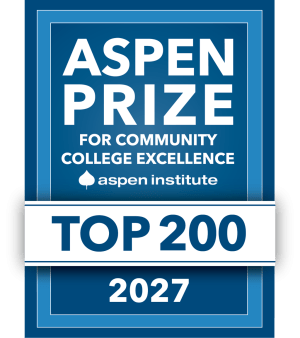Press contact: Kyla Kruse

SPRINGFIELD — The Aspen Institute has named Lincoln Land Community College as one of the 200 institutions from across the United States eligible to compete for the $1 million Aspen Prize for Community College Excellence, the nation’s premier recognition of high achievement and performance among two-year colleges. The top 200 colleges were selected from nearly 1,000 institutions based on student outcomes data, including retention, completion, transfer and bachelor’s attainment rates. Started in 2010, this is the ninth cycle of the Aspen Prize.
“Being named among the top 200 community colleges nationwide eligible for the Aspen Prize for Community College Excellence is an honor and a clear affirmation of our mission to transform lives and strengthen our communities through learning,” said LLCC President Charlotte Warren, Ph.D. “This recognition reflects our commitment to delivering high-quality, affordable education that empowers students to complete their goals, whether they are transferring to four-year institutions, entering the workforce or advancing in their careers. We are proud of the work our faculty, staff and students do every day to make our mission a reality.”
Together, these 200 colleges represent urban, rural and suburban areas across the country and serve anywhere from a few hundred students to tens of thousands. Some of these colleges focus primarily on workforce programs, while others focus on transfer and bachelor’s attainment or a combination of the two.
“The Aspen Prize rewards colleges that achieve the kind of outcomes that actually matter to students — completing college degree programs that, in turn, lead to lifelong success,” said Josh Wyner, executive director of the Aspen Institute College Excellence Program. “Aspen Prize winners offer a powerful message: Community colleges can deliver the kind of life-changing education that makes the American Dream real.”
Community colleges educate nearly six million students. The Aspen Prize process identifies and celebrates community colleges that provide a roadmap of effective practices and strategies for other colleges to follow.
“Among these 200 colleges are some really special places that deliver strong and improving outcomes for students across the board,” Wyner said. “Our job over the coming 20 months is to gather a lot more data and work with a deep bench of field experts to assess which of these 200 stand out so we can not only honor them with a monetary award, but drive attention to the most effective field practices that other colleges can replicate.”
The 200 eligible colleges have been invited to submit an application and participate in a rigorous review process that will culminate in the naming of the Aspen Prize winner in spring 2027. Over the coming 20 months, the colleges that apply for the Aspen Prize will be assessed based on (1) student outcomes data, ranging from student transfer and completion rates to employment and wages after graduation and (2) whether they have engaged in scaled practices that led to high and improving student outcomes.
